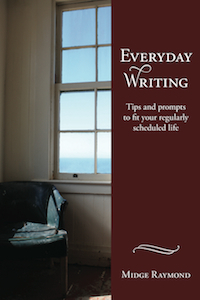Midge Raymond's Blog, page 36
August 1, 2012
5 Blogging Tips for Authors
If you’re a writer in 2012, you surely have a blog. Yet how do you know if you’re using your blog in the best way you can to promote your work (without being that dreaded writer, The Over-Promoter)?
There is no one-size-fits all way to write a blog — for as many writers as there are in the world, there are as many blogging styles. Yet if you don’t blog enough — or if you blog too much, or if you blog about the wrong things — you risk alienating the very audience you hope to engage. So here are a few tips to help you keep up your blog, your writing, and your connection with readers.
Keep it short and sweet. A blog post need not be the length of a novella — it need only be interesting, relevant (see below), and useful to the reader. Also, if you’re a writer, you need to be spending most of your time on your novel or poems, not blogging. Be brief and have fun — and then get back to your writing.
Keep it relevant. While you don’t want to be a shameless self-promoter, you do want your blog to be at least somewhat related to your writing, whether you talk about the process of writing your novel (research, writing rituals, inspiration for your characters, etc.) or whether you add content relevant to a nonfiction book (new recipes if you’re writing a cookbook, for example, or — as happens to be the case with this blog — new writing prompts that relate to Everyday Writing) or whether you link to stories thematically related to your fiction (I’ve often linked to travel stories related to settings that appear in Forgetting English).
Add visuals. Not every post will lend itself to images (and it’s better to use none at all than cheesy, unrelated stock photos), but keep in mind that what engages the eye helps to engage the reader. Make each post as visually appealing as possible. For example, I’m using bold type in this bulleted list to make it more reader friendly. (Is it working?) And, when in doubt, I can always add an image of my book (most people find this cover very relaxing).
Share the love. Use your blog not only to share your own writing but to connect with others. The more you reach out and share others’ blogs, the more your readers will gain. Link to other blogs, offer and host guest posts, participate in virtual book tours and giveaways. All these things will help foster a true online community. And don’t neglect to comment on others’ blogs and to respond to comments on your own. Both bloggers and readers love the feedback and the sense that there’s a real human behind the posts.
Have fun. While I saved this point for last, it’s probably the most important. Even if it means posting less, post only when you’re inspired and have something to say. The last thing your blog should be is a chore (and readers can tell when you’ve phoned it in), so take the time to consider how best to keep up with a blog in a way that engages and inspires you, and this in turn will keep your book out there in the world in a subtle yet important way.
Wishing you happy blogging!

July 30, 2012
Weekly Writing: Hunger
Write about a time you were hungry (this could be a physical or emotional hunger). Go into as much detail as possible.

July 27, 2012
Ten 5-minute writing prompts for summer
Thanks to the Author Exposure blog for featuring my 5-minute writing prompts for summer this week!
These 10 prompts, all designed with summer in mind, can be done in five minutes or fewer (though they can also see you through an entire weekend of writing if you let the prompts take you wherever they want to go…) And, for all you fiction writers out there, keep in mind that you can do these exercises from the point of view of your characters (these offer a great way to find your way out of a scene or to combat summer-induced writer’s block).
Wishing you a happy weekend of writing!

July 25, 2012
Finding room to write this summer
Thanks so much to Susan Rich for hosting me this week at The Alchemist’s Kitchen blog, where I offer 3 tips and prompts for how to find room to write during the summer months with all its temptations.
It’s very easy to be lazy in the summertime, especially when it comes to getting any serious writing done — but actually, the fact that we’re outdoors more than usual actually opens up opportunities: Even if we’re not sitting inside typing, being out in the world can feed our writing, simply by offering up so many different sensory experiences. If we look, listen, and think like writers, we can do more than we imagined possible in the relaxing days of summer.
Hope you enjoy the tips and prompts — and have a great week of writing!

July 23, 2012
Weekly Writing: Something forbidden
Write about a forbidden food. And why it’s forbidden.
As time allows, take this prompt further and write about other “forbidden” things in your life, from your early childhood until now. Why and how (and by whom) had these things become forbidden?

July 18, 2012
Notes from the Port Townsend Writers’ Conference
It would be impossible to sum up the amazing first week of this year’s Port Townsend Writers’ Conference, which was, as always, an inspiration. Not only is Port Townsend a gorgeous setting in which to immerse oneself in All Things Writing, the writers it brings together creates such an incredible energy.
In addition to teaching five afternoon workshops on topics from scene to character to dialogue — and the writers who join me in these classes always have something to teach me — I had the opportunity to learn from the craft lectures of such writers as poet Ashley Capps (on empathy in writing) and fiction writer Jennine Capó Crucet (on humor), as well as to enjoy their evening readings and many others, among them Judith Kitchen, Dinah Linney, Sam Ligon, Diane Roberts, Erin Belieu, and Chris Crutcher. It truly feels impossible to sum up the wealth of good writing and conversation of the week, but author Donna Miscolta does a great job over on her blog.
I also fit in a little writing time, which is so much easier to do here than in my regularly scheduled life. For one, the setting is so peaceful; looking out over the water or watching deer walk past relaxes the brain in a way that just doesn’t happen when I’m trying to fit writing in amid all my other work.
The other brilliant thing about being at Fort Worden is that Internet access is available in only a couple of spots — which means that unless you go to these specific places, you’re disconnected. I had many conversations with writers about how well our writing went when we didn’t have web access; we all experienced big breakthroughs in our projects thanks to having time and space uninterrupted by email, news, and social media.
Now that I’m back, I’ve created a few new rules for myself in order to keep my writing momentum going. I have set myself new, limited social media hours, even for work-related posts and tweets (one thing I learned from being mostly offline for a week is that taking some time off isn’t going to make you disappear as a person, an author, or a business), and I’ve created specific writing goals for myself as well. I’ve also realized that being accountable is part of the deal: If you have to answer to someone about why you haven’t met your deadline, or why you got online during your offline writing time, it makes you think twice about procrastinating. So I’ve got weekly check-ins all lined up.
All these little rules may sound over-the-top — but as most of us know, it’s all too easy to get distracted and to let the writing slip. So here’s my tip for you: As the summer continues, start defining some guidelines and goals, and find yourself a writing buddy to keep each other on track. And, if you can, find a conference or retreat that will help remind you that your writing is vital and important.

July 16, 2012
Weekly Writing: Hand-me-downs
Write about hand-me-downs — clothing, baby clothes and toys, family heirlooms. Are you usually the giver or receiver of hand-me-downs? Write about all the thoughts and emotions, positive and negative, that surround the notion of secondhand things.

July 8, 2012
Weekly Writing: Quickies
I’m happy to present more Quickies, which of course means you have no excuse not to write this week. Each of these brief prompts can be done in five minutes or fewer. Enjoy!
Write about toast.
Describe your last bad commute.
Write about a dying plant.
Describe your earlobes.
Write about sand between your toes.

July 6, 2012
How to disconnect (at least a little bit…)
In Everyday Writing, I tell a story about my friend Judy Reeves, who is brilliant at carving out writing time. The very first time I ever called her on the phone, I got this message: “If you’re calling before 1:00 p.m., this is my writing time. I’ll get back to you after 1:00.”
I immediately decided I wanted to be just like Judy. (Check out her awesomeness by visiting her website, where you’ll find all her books, among them the amazing A Writer’s Book of Days).
Despite my vow to go into seclusion more often to write, I’m still not quite as good at disconnecting as I’d like to be.
I’m able to leave my phone behind pretty easily; I don’t like the phone very much. Disconnecting from the Internet is another story. It’s partly that I am a writer trying to promote a book — this requires blogging, responding to email, and being active on social networks. It’s also partly that I am the c0-founder of a new press, which means I need to be out there promoting our books, our press, our authors — and we also read our submissions online. So my life in many ways revolves around being connected — the challenge is how to find a balance.
So I’ve adopted a few new guidelines, aimed to create more offline writing time for myself without neglecting my necessary online duties. I hope they’ll inspire you as well:
– Take one afternoon (or hour, or quarter hour) per week of Me Time. This can be writing time, but I’ve decided that it doesn’t need to be: As writers, we need to clear our brains in order to make room for creativity, and this might include meditation, reading, or just walking around in nature to clear the mental clutter. As author Tim Kreider writes in this article, “Busyness serves as a kind of existential reassurance, a hedge against emptiness” — and I think this may be especially true for writers: We worry that if we’re not writing every single free moment of every single day, we aren’t writers after all.
Fortunately this isn’t true: You can be a writer whether you write six hours a day or six days a year. One thing we all must do, however, is get out and free our minds of the busyness. I recently chose a gorgeous summer afternoon with no pressing deadlines (that is, whatever needed to be done could be done after sunset) and went to the park with a blanket and a notebook. The break was rejuvenating in so many ways, especially creatively, and I returned with not only pages of new ideas but a sense of peace and relaxation I’d never have had without escaping the office and the computer. I was only away from my desk for an hour — and keep in mind that even fifteen minutes does wonders, so don’t dismiss this idea if you’re short on time. And best of all, I was joined by another soul seeking a little quiet…
– Log out of email…at least temporarily. I am one of those people who quits whatever she’s doing to respond to an email. Clients and authors are always commenting on the fact that I write them back at all hours of the day and night, including weekends. Whenever I take more than a couple of hours to respond to an email (usually because I’m traveling, moving, or because a storm has wiped out my Internet connection), people wonder whether I’m sick, injured, missing, or have been abducted by aliens. Really, there’s no reason I need to respond to every email within seconds. So I’m training myself to log in only a few times a day — this means fewer interruptions, which means a more efficient work day, which ultimately means more writing time.
– Division of labor. Because I work from home, my office is where I do it all: from freelance projects to editing to conference calls, and everything in between. It’s also my writing space — which means it’s very difficult to switch from work mode to writing mode. So I’m working toward adopting a more 9-to-5 life for the work-work, and a 5-to-9 schedule for my writing work. When you work for yourself, it’s basically a 24/7 lifestyle, for better or worse, and anyone who’s ever started a business knows that this means working around the clock, especially in the beginning. But at some point, you need to find a balance — and whether it’s due to your day job or the 24/7 responsibility of raising a family, finding writing time is always the biggest challenge. But do make the effort to separate the two: Divide your work time from your family time from your writing time, and be fully present no matter which mode you’re in at a given time. Life will be richer all around this way…and best of all, your writing time will be separate and fulfilling.
Finally, here’s a writing prompt, which is actually a bit more of a scheduling prompt (but one aimed to lead to more writing!):
Write out a schedule for the week ahead. In this schedule, work out the following:
1. Fit in one afternoon for Me Time.
2. Define the hours you will be on email (for example, from 9-11 a.m., 1-3 p.m., and 4-5 p.m.) and use your off-email hours to accomplish as much as you can — and see how much extra time you have at the end of the day. Use this time to write — for example, maybe you’ll find that this system frees up enough time for you to take your lunch hour to write instead of working at your desk.
3. Find slots of time in your daily schedule that allow you to fit in writing time amid your other responsibilities. Even if you start with only 15 or 30 minutes per week, keep working with your schedule to fit in as much time as you can to meet your writing goals.
Happy writing!

July 3, 2012
Beyond the Margins: 5 tips and prompts for busy writers
A million thanks to Randy Susan Meyers for hosting me on the wonderful Beyond the Margins blog today, where I offer 5 tips and prompts for how to be an Everyday Writer.
Most authors have busy schedules — these days, who doesn’t? — and yet it is possible to keep writing, even if you aren’t able to sit down in the chair. These 5 tips will help you see the ways in which you can think like a writer, which is the next best thing to putting words on the page.
Happy writing!














